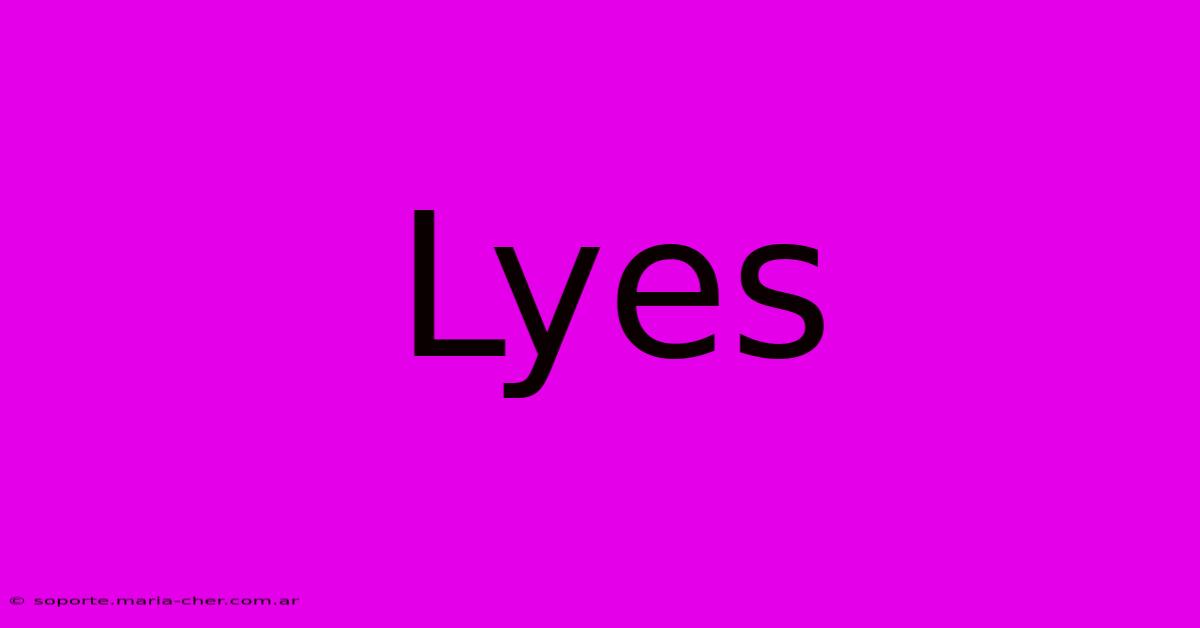Lyes

Table of Contents
Lyes: Understanding Their Properties, Uses, and Safety Precautions
Lyes, also known as alkalis, are highly alkaline substances that are corrosive in nature. Understanding their properties, uses, and safety precautions is crucial for anyone handling them. This comprehensive guide will delve into the world of lyes, exploring their various types, applications, and the importance of safe handling practices.
What are Lyes?
Lyes are strong bases that readily react with acids to form salts and water. They are typically characterized by their high pH levels (above 7), indicating their alkaline nature. The most common types of lye include:
- Sodium hydroxide (NaOH): Also known as caustic soda or lye, this is the most commonly used lye in various industrial and household applications.
- Potassium hydroxide (KOH): Known as caustic potash, this lye is stronger than sodium hydroxide and finds applications in specialized industries.
Key Properties of Lyes
- High pH: Their high pH makes them corrosive and capable of causing chemical burns.
- Reactivity with water: Lyes react exothermically with water, releasing heat. This reaction can be vigorous and potentially dangerous.
- Corrosiveness: Direct contact with skin or eyes can cause severe damage. Inhalation of lye dust can also be harmful to the respiratory system.
- Solubility in water: Lyes dissolve readily in water, forming highly alkaline solutions.
Uses of Lyes
Lyes have a wide range of applications across various industries and even in some household chores:
- Soapmaking: Lye is a crucial ingredient in the saponification process, where it reacts with fats and oils to produce soap. This is a popular DIY activity, but safety precautions are paramount.
- Drain cleaning: Some drain cleaners contain lye to break down organic matter causing clogs.
- Food processing: Lye is used in certain food processing applications, such as making pretzels and olives. However, it's crucial to note that food-grade lye must be used and handled correctly.
- Industrial applications: Lyes are extensively used in various industries, including papermaking, textile production, and metal processing.
Common Household Uses (with extreme caution):
While some household uses exist, always prioritize safety:
- Cleaning: Diluted lye solutions can be used for certain cleaning tasks, but stronger concentrations should be avoided.
- Removing paint: Lye can be used as a paint remover, but this requires careful handling and appropriate protective gear.
Safety Precautions When Handling Lyes
The handling of lyes necessitates strict adherence to safety protocols. Failure to do so can result in severe injury or even death.
- Wear protective gear: Always wear safety goggles, gloves (rubber or nitrile), and long sleeves when handling lye.
- Work in a well-ventilated area: The reaction of lye with water releases heat and potentially harmful fumes.
- Add lye to water, never water to lye: This prevents splashing and a potentially dangerous exothermic reaction.
- Keep out of reach of children and pets: Lye is highly toxic and should be stored securely.
- Neutralize spills immediately: In case of a spill, neutralize the lye with a weak acid like vinegar, followed by thorough cleaning.
- First aid: In case of skin or eye contact, immediately flush the affected area with copious amounts of water for at least 15 minutes and seek medical attention.
Conclusion
Lyes are powerful chemical compounds with numerous applications. However, their corrosive nature demands utmost caution. Understanding their properties, uses, and safety procedures is crucial for safe and responsible handling. Always prioritize safety when working with lyes, and never hesitate to seek professional advice if you are unsure about any aspect of their use. Remember, safety should always be the top priority when dealing with such hazardous materials.

Thank you for visiting our website wich cover about Lyes. We hope the information provided has been useful to you. Feel free to contact us if you have any questions or need further assistance. See you next time and dont miss to bookmark.
Featured Posts
-
Witness The Art Of Natures Canvas The Ultimate Guide To Landscape Photography
Feb 08, 2025
-
Elevate Your Earring Game Unlock The Mystery Of Piercing Your Upper Ear Lobe
Feb 08, 2025
-
Exposed The Lies That Are Destroying Your Trust
Feb 08, 2025
-
Glow In The Dark St John Evening Dresses That Illuminate Your Nighttime Elegance
Feb 08, 2025
-
The Timeless Legacy Exploring The Influence Of Dorothea Langes Social Realism
Feb 08, 2025
